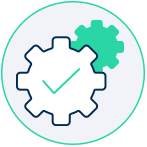Share this
ASC 842 Lease Accounting Software for the Long Term
by Matt Waters, CPA on July 12, 2024
ASC 842 presented accountants like me with an unprecedented challenge in accounting for leases.
Public companies shifted from manual lease accounting processing via spreadsheets and calculated their initial ASC 842 balances with the help of lease accounting software.
However, lease accountants have now discovered that initial compliance was the easy part!
When companies had to comply with ASC 842 in 2019 right on the heels of revenue recognition changes, many took the fastest path to initial lease accounting compliance. There was no shortage of software options as a glut of venture capital-backed startups emerged to take advantage of the environment.
Those opportunistic compliance calculators filled a need.
For a hot second, at least.
Ongoing ASC 842 compliance is complex
Many lease accountants are now surprised to find that their original software solutions are not suitable for ongoing compliance.
Complex requirements due to business combinations, restructurings, impairments, abandonments, and terminations are pushing well past the limits of systems designed for initial ASC 842 compliance.
Accounting teams have struggled specifically to:
- Keep up without automation to remeasure amortization schedules
- Apply the correct discount rate
- Pull in the latest market data for real estate
The rush to compliance induced a lot of short-term “solutions” that ultimately failed to account – no pun intended – for long-term feasibility and sustainability. Amid the ongoing industry-wide pressures facing accounting talent, this is producing a major impact to balance sheets and internal operations.
Fewer resources = more accounting mistakes
These heavy workloads have overburdened already overworked accountants, making them more prone to error.
A recent Gartner study showed some startling figures to illustrate this:
- 73% of accountants say their workload has increased because of new regulations
- 82% say economic volatility has increased demand for their work
- A third of accountants admitted to making several financial errors per week!
These instances of erroneous data or inaccurate financial statements add up to create quite the business impact.
A large portion of today’s lease accountants were not part of the 2019 project team. Not only do they face a steep learning curve, in many cases they are forced to work with inadequate systems that they inherited.
The lesson here was that it takes more than just mindlessly throwing technology at the problem to get it solved.
But there is hope! One of the very few bright spots in the Gartner study was that studies that properly embraced digitalization of their financial operations experience a 75% reduction in financial reporting errors.
Better lease accounting software is the key
The key provision here, however, is that this effectiveness hinges on software that is user-friendly, customizable and provides actionable insights in a single interface.
The best course of action for lease accountants now is to forget the sunk cost of initial compliance, learn from any mistakes, and implement a forward-looking plan for optimizing the lease accounting function.
Lease accounting solutions have to be advanced enough to actually solve both the problems of today and those to come.

Ready to make a change for the better?
Get the ultimate replacement guide!
Share this
- ASC 842 (78)
- Lease Accounting Software (62)
- Accounting Teams (38)
- Lease Administration Software (18)
- Retail Tenants (13)
- Commercial Real Estate (11)
- Lease Management (10)
- Market Data and Analytics (7)
- Real Estate Teams (6)
- ESG (5)
- Success Stories (5)
- News and Media Coverage (3)
- Transaction Management Software (2)
- Customer Success (1)
- Office Tenants (1)
- August 2024 (5)
- July 2024 (3)
- June 2024 (3)
- May 2024 (4)
- April 2024 (1)
- February 2024 (1)
- December 2023 (4)
- November 2023 (6)
- October 2023 (4)
- September 2023 (2)
- August 2023 (2)
- July 2023 (3)
- May 2023 (2)
- March 2023 (1)
- February 2023 (3)
- December 2022 (3)
- November 2022 (4)
- October 2022 (4)
- September 2022 (1)
- August 2022 (4)
- June 2022 (1)
- May 2022 (4)
- April 2022 (8)
- March 2022 (3)
- February 2022 (1)
- October 2021 (2)
- September 2021 (1)
- August 2021 (15)
- July 2021 (3)
- June 2021 (1)
- May 2021 (1)
- April 2021 (3)
- March 2021 (1)
- January 2021 (1)
- December 2020 (3)
- November 2020 (1)
- October 2020 (2)
- September 2020 (2)
- August 2020 (3)
- July 2020 (2)
- June 2020 (3)
- May 2020 (1)
- April 2020 (1)
- March 2020 (1)
- February 2020 (1)
- December 2019 (1)
- October 2019 (1)
- September 2019 (2)
- August 2019 (3)
- July 2019 (2)
- April 2019 (69)
- October 2018 (1)
- August 2018 (1)
- July 2018 (1)
- June 2018 (1)
- May 2018 (1)
- April 2018 (2)
- March 2018 (3)
- February 2018 (2)
- December 2017 (1)
- August 2017 (3)
- June 2017 (2)
- May 2017 (2)
- April 2017 (1)
- March 2017 (2)
- January 2017 (2)
- November 2016 (2)
- July 2016 (1)
- June 2016 (1)
- July 2015 (1)
- March 2015 (1)
- June 2014 (1)
- April 2014 (11)
- October 2011 (1)
You May Also Like
These Related Stories

Day 2: What Happens After Lease Accounting Compliance Implementation

How can Lease Accounting Software Help with ASC 842 Compliance?




